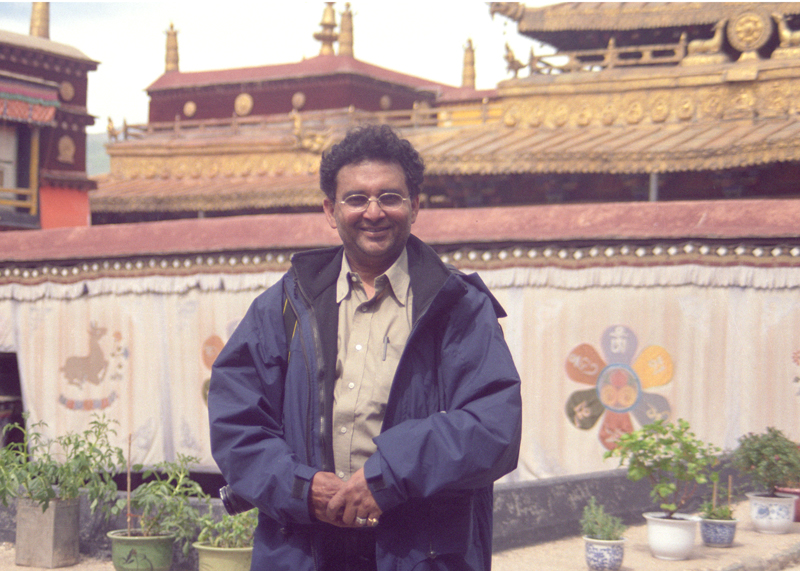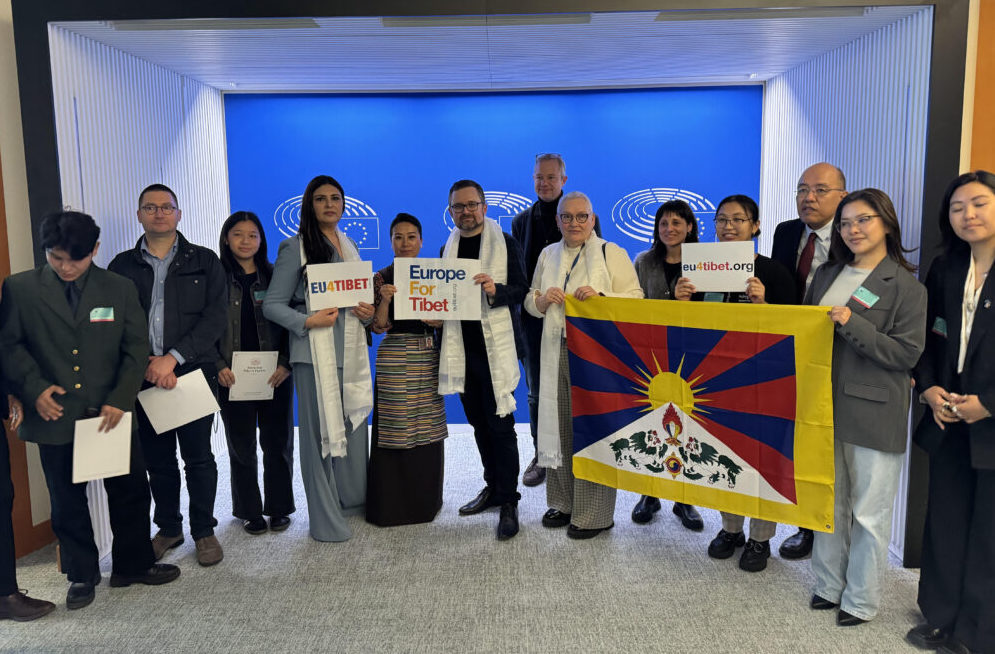By Vijay Kranti
(Part of the ‘My journey through the Tibetan mindscape’ series)
A popular and old philosophic Bollywood Hindi song goes with words:“Kaise Bazar Ka Dastoor Tumhen Samjhaun Main, Bik Gaya Jo Wo Kharidar Nahin Ho Sakta”. In simple words it means, “Let me tell you the basic rule of the market place. Anyone who himself is already sold out, can’t be a buyer”. But in the strange play of events at a great monastery and a popular tourist place of “China’s Tibet” I was thrilled to be player of a just opposite game. I, a freer professional from the free world, was suddenly adopted as an honoured guest by those who themselves were cursed to live life of slaves.
Chinese are known masters in the art of playing bluff and presenting even their weakest hand as a divine ace. Dalai Lama and his supporters world over took more than three decades of commitment and hard work to expose China’s inhuman games in Tibet and thereby making Tibet and Dalai Lama as the most popular household names in the civilized world. But finally it was the communist masters of Tibet who decided to monetize Tibet’s popularity into billions of tour-dollars by developing it as a popular tourist destination. They simply refurbished and repainted very same Tibetan monasteries and Buddhist temples which they had destroyed and desecrated over past decades in order to cleanse Tibet of its religious soul and presented it to the gullible tourists as a proof of China’s ‘love and respect’ for Tibet’s religion and culture.
Past seven decades have witnessed a well orchestrated campaign of Beijing to overwhelm Tibetan resistance against Chinese colonialism by settling millions of Hans in cities and town across Tibet. After occupying Tibet in 1951 their first goal was to complete the process of developing military infrastructure in Tibet to convert it as China’s military outpost in South Asia. Once it was over, the Communist leaders of China went in for a massive ‘West Development Strategy’ to create modern cities and facilities to make life easy for the early settlers as well as to attract millions of more Hans to settle permanently along borders of India, Nepal and Bhutan.
It is not surprising to note that Tibet has become a popular and modern tourist attraction both for the Buddhist faithful as well as for ordinary tourists who love to see exotic places with modern comforts. But there is also a microscopic tribe of people like me who would like to take advantage of China’s decision to open Tibet for outsiders and go around to see how the occupied and enslaved Tibetan are living under Chinese colonial rule. It is this journalistic itch which has taken me to all five provinces (Sichuan, Yunnan, Qinghai, Gansu and TAR) of the Communist China where Tibetans live today.
I had just paid money for my entry ticket for a famous monastery and was putting the change back in my pocket when I suddenly discovered a young man sitting by the ticket seller asking me in English, “Are you Pakistani?” I could easily make out that both of them were Tibetans. One of them was a monk in maroon robes. This sudden question was a double shock for me. In the first decade of 2000’s it was difficult finding someone in Tibet who could speak English and would dare to speak to a foreigner. And secondly, by my Indian instinct, I found it insulting to be dubbed as a Pakistani. But soon I realized that there were more Pakistanis visiting Tibet and China than the Indians because of obvious China-Pakistan affinity.
My immediate response was, “No. I am Indian.” But before he could ask me anything further I fired my pre-tested friendly salvo, “I am from Gyakar.” I could see the electrifying impact of my salvo in typical native Tibetan language. I saw a wide smile on their faces and an affectionate glint in their eyes as both of them stretched their faces much closer to the window to have a better view of me. In Tibet people instinctively use ‘Gyakar’ for India which reflects their love and respect as it means ‘White-Land or Holy-Land”. Interestingly, even after seven decades of colonial relations with China, they almost invariably use ‘Gyanak’ for China meaning ‘Black-Land or Inauspicious-Land’.
Since I was alone on the ticket window, we all three felt comfortable in carrying on our discussion. The monk, a young man in his late twenties, did not waste time in formalities and asked me, “Do you know Dalai Lama?” I gave him a wide smile and said, “Yes I know him and I have met him many times.” “Are you sure you have seen him?” he asked.
“Yes I am sure. I love him. And I think I can say that he also loves me,” I said. It was the other boy this time who stretched his hand out of the counter and touched my shoulders with a big smile and eyes wide open. From his touch and curious smile, I could easily feel his sense of respect and adulation for me. Then there was a volley of questions about the wellbeing of Dalai Lama and his popularity etc. I did my best to satisfy their curiosity and desire to know what was possible in a short dialogue like this. They looked overwhelmed by this discussion and I could feel their enthusiasm. I could make out that their knowledge of English was limited but enough to ask question and grasp what I had to say. Suddenly they started talking to each othe . And after a short lull the ticket seller asked, “Give back your ticket to me.”
“But why? I want to go inside,” I resisted.
“No. You give ticket and take money,” by that time he had counted the ticket price and put the money on the counter. I was surprised at this sudden change. I thought it better to move away from the window. But in the meanwhile the other man had opened the side door and came out. He was relatively more fluent in English. What he said was just beyond my imagination and made me almost speechless for a while.
“Sir we both feel that it is not good to charge ticket money from someone who is from Gyakar, from India. Our Dalai Lama is your guest. So how can we take money from someone who is host to our Dalai Lama?”, he said and placed the money from the counter in my hands. He took the ticket gently from my hand. Placing it back on the ticket counter for his friend behind the counter he said, “Don’ worry Sir. I will take you inside without ticket. One of my friends inside will take you around for as long as you want.”
I was stumped. No words to say my thanks. As I put the money in my pocket my eyes were swelling with tears. I held his hands in my hands only to discover that two tears had already rolled down on his cheeks.
I will not say here how many RNBs I save in this deal because that will reveal the identity of the monastery and also of the two young men. But I can say that it was worth more than as many thousand dollars as the RMBs. For next two hours I was an honoured guest of such friends who, unfortunately, themselves have been cursed to live life of colonial slaves of their communist masters. I hope they are fine.
(Views expressed are his own)
The author is a senior Indian journalist, photographer and a keen Tibet watcher for over four decades. He visited Tibet many times on his self assigned learning and photo-expeditions. He was the first ever Indian journalist who could visit Tibet without Chinese patronization or control. Here is the latest in his series of his memoirs with Tibet and Tibetan people.











4 Responses
Vijay Ji,
Thank you for sharing your experience. We need more people like you to support us and free Tibet from the CCP.
Looking forward to read more about your experiences.
GT
Vijay Kranti ji ,
Thank you very much for sharing this. This reminds of an incident when a friend visited Chengdu many years ago. He was excited when he saw a south asian looking man and greeted him with a “Ram, Ram” The guy shook his head and said “assalamaleikum”. He was a Pakistani.
This clearly reflects the indomitable love, affection, faith and spirit of the Tibetan people towards His Holiness despite their indoctrination by the CCP and its false propaganda and harsh punishments for those who violate their decree which will definitely bear fruit in the near future as history tells us. Hope and pray to materialize this wish of the Tibetan people and millions more of their sympathizers the world over soon.
It was a heart touching memoir of your journey to Tibet. I thank you for sharing with us. Let us all pray for the well being of our beloved brothers and sisters in Tibet.
SAVE TIBETAN..!!!!!